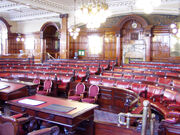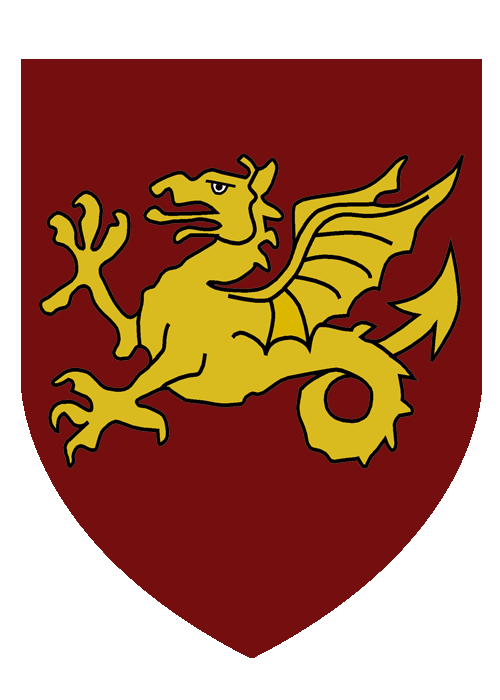Government and Politics Ideas[]
- Wessex is Conventional Ceremonial Constitutional Monarchy, akin to Belgium/Netherlands/Spain.
- The administrative capital is at Bristol (Brycgstow). This is the seat of the Witenagemōt or "Council of Ministers".
- The ceremonial and religious capital is at Winchester (Wintanceastre). This is the seat of the Folcagemōt (legislature).
- The Head of State is the King of Wessex (Westseaxnacyning). The person of the king is His Grace King Alexander I (alias the Seventh Marquess of Bath). Since 2010 there has been the regency of Prince Ceawlin II as acting Head of State.

King Alexander I of Wessex
- The Head of Government (the Prime Minister or Witanagerefa) is a member of the national legislature (the Folcagemōt). He or She is appointed by the king to lead a government. The Witanagerefa appoints a council of ministers (Witenagemōt) made up of any number of ministers (Witanmen)
- There is a bicameral national legislature or Folcagemōt. The two houses of Folcagemōt are as follows:
- The House of Churls is the Lower House of the Folcagemōt and is made up of 600 Churls who represent the people proportionately throughout the realm elected in six hundred equally populous single-member constituency through plurality.
- The House of Ðegns is the Upper House of the Folcagemōt and consists of 220 Ðegns (Thegns) who each represent one Hundred. Every Shire in Wessex is divided into any number of Hundreds which are the ancient local government administrative body in Wessex.

The House of Churls in Winchester
- Wessex has a system of local government and justice based on the Shires and the Hundreds within them.
- The titular head of each Shire is the Ealdorman who is formally appointed (and re-appointed) by the Westseaxnacyning following the advice of the Witanagerefa. The Ealdorman is the chief judge in the Shire and appoints all magistrates.
- The chief executive of each Shire is the Sherrif (Sciregerefa). He leads the largest party in the Sciregemōt or 'Shire Moot') and governs the Shire. The Sciregerefa may be dismissed by the Ealdorman but new elections must be held for the Sciregemōt within 14 days.
- Every Shire is divided into a number of Hundreds and this number varies from Shire to Shire. These Hundreds have a council or Hundredegemōt who choose from amongst their number a Hundredegerefa (the 'Reeve') who is the local administration head and a Ðegn who represents the Hundred at the Folcegemōt. Like the Scirgerefa, the Hundredegerefa may be dismissed by the Ealdorman of the Shire at any time but new elections must be held for the 'Hundredegemōt within 14 days. The Ðegn may not be dismissed and remains in office until the next elections for the Folcagemōt.

Hundreds of Sumersæt
- Hundreds are divided into any number of Ðorps (villages) which usually, but not always, have their own 'Ðorpege'mōt.

His Excellency Wiglaf, the Lord Ealdorman of Sumersæt
- Elections for all four representative bodies (Folcegemōt, Sciregemōt, Hundredegemōt and Ðorpegemōt take place every five years, staggered at 2.5 year intervals.
- In the Burh of Brycgstow (City of Bristol) there is a Burhegemōt and a Burhegerefa who exercise the same powers as a Sciregemōt and a Scirgerefa. Unlike in a shire, the burh of Brycgstow has no Ealdorman and comes under the direct supervision of the Hæmwitan'man (Interior Minister).
- In the Dhugeth Kernow (Cornwall) there is a different system reflecting their autonomy. Here, the Dhug (Duke) exercises executive power and rules through the Seneth or "Senate". The Dhug appoints the members of the Seneth from among the elected Gorsethow (or "councillors") of the Keverangow. Kernow is divided into seven Keverangow (roughly translated as "Hundreds") and each of these is governed by an elected Gorseth or "council" of sorts, chosen every ten years. As in a hundred of mainland Wessex, each Keverang returns one Ðegn who sits in the House of Ðegns in Winchester.
- Oversight of Cornwall comes from the Westwealans Scryingman, a senior member of the Witenagemōt.

The Dhug of Kernow receiving homage from his loyal Gorsethow
History Idea[]
- Invasion of Dumnonia in the 8th Century. (Cornwall). Wessex never almagated to form the Kingdom of England. One of the oldest nations in the world.
- Once the seat of an extensive Empire, with territories in the Americas, Africa and Asia. Fueled by other European Colonialism.
- British Occupation during the Seven Years War with France, ended the Wessen Empire, and Wessex was occupied by Britain until 1805, when a Velvet Revolution (Peaceful revolution) lead to the creation of a new independent Wessex (however Anglicised), based on the principles, of Tolerance, Freedom, Equality and Peace. (Known as the Four Principles of Wessex)
Society and Culture Ideas[]
- Tri-Lingual State, with English as the most predominant following British Occupation. Westseaxnasprecan (a form of Old English) is the second most spoken language and taught in all schools. Cornish (Kernewek) is the third most spoken and taught alongside the other two languages in Cornwall (Westwealas) and Devon (Defnascir).
- Christianity (Church of Wessex) is the main faith with the Archbishop of Winchester as its supreme head.
- Forms of paganism flourish in Wessex. The ancient Anglo-Saxon Folcegeleafa is the largest pagan creed and mainly practised in the eastern and northern shires. Drycræft (or in the Welsh Welsh tongue, Drywydiaek, or Druidism) is mainly practised in the west and in Cornwall it is still a majority religion in some areas. Atheism is also a very big sector of beliefs with secular ideologies such as gay Marriage, gender equality and pacifism beginning as early as the 1800's.
- Liberal Social government allows many civil freedoms, which creates a culture of expression and individuality.
- As per Anglo-Saxon beliefs, Gender Equality is strong.
- Freedom of speech, the press and expression in general are given greater importance than any notions of offence.
- Technologically advanced country with high Human Development Rate from former exports of fossil fuels and tourism.
Ideology Ideas[]
- Four Principles of Wessex = Tolerance, Equality, Freedom and Peace (National Motto of the Country).
Shires[]
- Wessex is divided into eleven Shires and two special administratrive zones.
- Most shire have the suffix '-shire' on the end (scir), meaning "share". Some shires do not and instead have the suffix '-set' (sæt) meaning "people of".
- Bristol (Brycgstow) is a city (burh) outside of the shire system.
- Cornwall (Westwealas) is a self-governing territory, known in their native Westwealasætna tongue as "Kernow".
- The Eleven Shires are;
- Bearrucscir (Berkshire) Defnascir (Devon), Dorsæt (Dorset), Gleawcesterscir (Gloucestershire), Hamtunscir (Hampshire), Herefordscir (Herefordshire), Oxnafordscir (Oxfordshire) Sumorsæt (Somerset) Wihtscir (Isle of Wight), Wigreceastrescir (Worcestershire), Wiltunscir (Wiltshire)
- Coat of Arms is the arms of the house of Cerdic from 1500's, adopted by parliament officially in 1806.
Things that Need Doing[]
- Finish off Government Page
Transport SDF Pages to new category/contextRename Bristol Page- Finish off Bristol Page - Need to Finish Off!!!!!
Education - RewriteMedia - RewriteMusic - RewriteCulture Page - Rewrite- Foreign Relations Page - NEED TO FINISH!!!
- Finish Shires Still need to add pages!!!!
Change all old language to new language.- Finish Channel Islands, and Hath Etherald and Mikwelon articles
- Maps of Wessex
- Possible Cornish Independence Referendum Story?
Kingdom Of Wessex > Wessen Empire > Earldom of Wessex (Tudor Conquest) > Commonwealth of Wessex (rebellion)
- Earldom of Wessex - Vassal, Client State of Kingdom of England/Great Britain/Commonwealth/Dominion of British Empire





